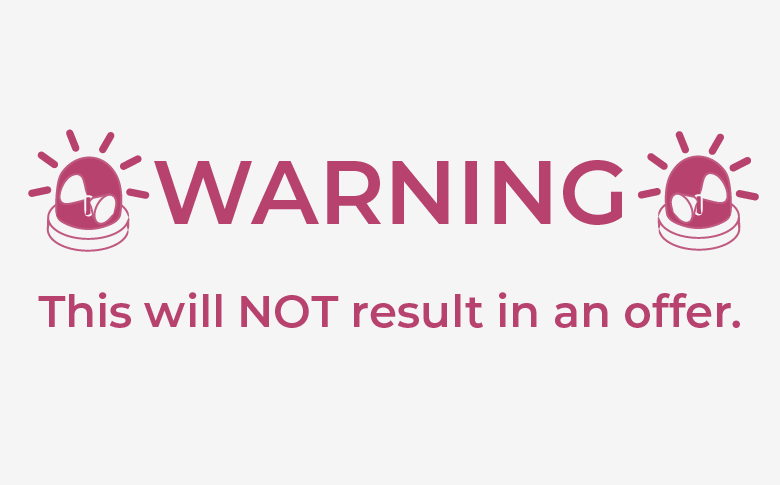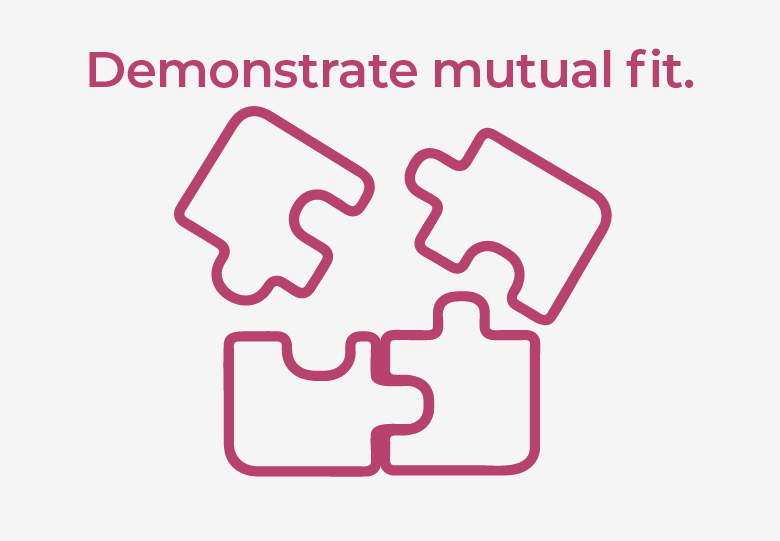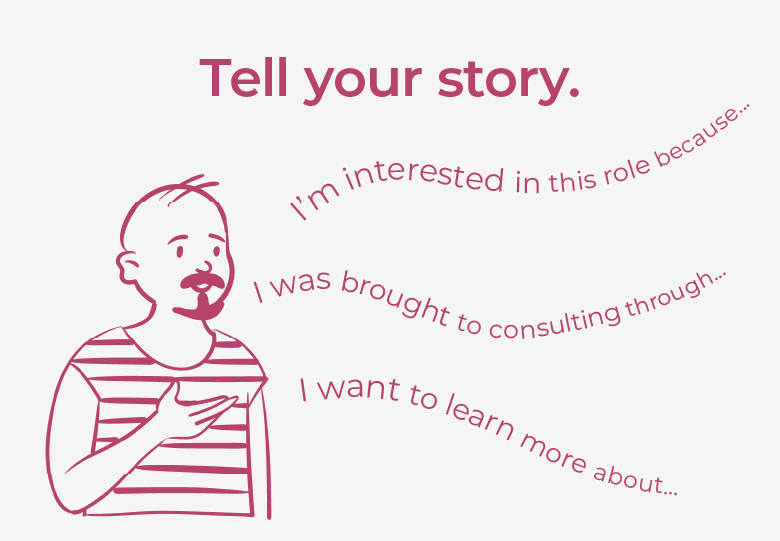The Key to Answering "Why Consulting?"
Practical advice on answering the most important question in your consulting interview.
Every September at Harvard, management consulting firms like McKinsey, Bain, and BCG (MBB) successfully fill hotel ballrooms and conference halls with hundreds of students, including me, who are interested in their internship and full-time opportunities. When I surveyed the room, I could see students from all sorts of academic and professional backgrounds. Of course, there were the members of the student consulting clubs that had been consulting for Fortune 500 companies since they set foot on campus. However, there were also computer science majors who had interned at big tech companies like Google and Facebook, government majors who had worked on a politician’s campaign, and even pre-med students who had been conducting biology research since high school.
During these info sessions, I realized how well management consulting firms are able to market themselves to applicants of all backgrounds and the variety of reasons someone may be interested in consulting. They expect you to retain that information and, during the interview process, use it to market yourself. Why is a consulting job the right fit for you in the first place? In this article, I hope to help you answer that inevitable interview question about your decision to pursue this unique career option.
The Question
Throughout my two years of recruiting for an internship and full time position, I had a total of ten rounds of consulting interviews with top firms including McKinsey, Bain, BCG, Oliver Wyman, and Cornerstone Research. Other than the inevitable case interviews, not much was consistent. However, I could always count on being asked "why consulting?" during every fit interview. Consulting internships and analyst positions are selective and competitive. These consulting firms know there are many reasons to want to go into consulting, and they want to know what yours is.
Although this is an interview question that you will inevitably come across if you recruit for consulting, it is not a question that should worry you. You should view this question as yet another opportunity to distinguish yourself from other candidates, highlight relevant aspects of your background, and explain your potential career path.
But before I talk about the right way to answer this, I have to touch on the ways you shouldn't.
What Not to Say

Countless aspects of the management consulting role may be reasons why you want to pursue consulting. However, not all of these reasons are ones you should include in your response to the interview question at hand. To boost your chances of getting a job offer, avoid talking about these reasons.
Compensation and Perks
Two of the more tempting aspects of the role are its compensation and perks. However, these should not be primary reasons you provide to your interviewer. In fact, these would be inappropriate responses for any job interview. For any job, interviewers need to have confidence that a potential employee will have the intrinsic motivation and drive to succeed. Candidates must show interest in the responsibilities of the role itself. This is especially true for consulting, where analysts are bound to face a lot of challenges, and even periods of burnout.
Interviewers, who are often middle or upper management that lead case teams, need evidence from interviewees that even when the job gets tough, they will have the drive and interest to remain engaged and get the job done. The compensation and perks associated with consulting and any job should be viewed as the reward for strong performance - not the reason to show strong performance.
Exit Opportunities
Another aspect of the role that is best to avoid mentioning during an interview is the wide range of exit opportunities (like start-ups, private equity, or investment banking). Again, as with any job, interviewers often prefer to believe that every potential candidate is planning to remain with the company indefinitely. While it is true that many management consultants do in fact leave after a few years, many firms want to believe that every consultant they hire has partner potential.
To understand why firms often have this mindset, recognize the significant amount of investment that firms pour into their employees. Many industry professionals often say that new consultants are a “net-negative” for the first year on the job. That is, while they are still training and getting accustomed to the role during their first year, the amount of resources that have been invested in them is greater than the value they are able to provide. As such, it is often preferable for firms to hire people they believe will remain with the company long term. By mentioning exit opportunities, candidates may make the interviewer question whether they are worth the investment.
It is important to note that while this is not very appropriate to mention during an interview, many firms do have an open culture when it comes to discussing new career opportunities. In fact, some firms (such as Bain) will even sponsor externships, where employees can work for another company for a few months and then resume their consulting role.
What to Say

Because consulting can appeal to such a wide range of people for a variety of reasons, there is obviously no one way to answer this interview question. However, the following approach can make for a strong response and is adaptable to any background. My philosophy when it comes to interviews is that my goal is two-fold: show that I am a fit for the job, and show that the job is a fit for me. With this in mind, I like to structure my response by answering the three following questions:
- What about your background led you to consulting?
- What about the role itself interests you?
- What are you interested in learning about or doing with the role?
With this structure, there is ample opportunity to portray why you and consulting are a match. Let us take a look at each question.
“What about your background led you to consider consulting?”
This is the part of the response in which you incorporate your resume. Think about your past experiences. What aspects of your personal experiences did you like that you think will remain true in a role in consulting? What aspects of your past experiences did you not like that you think will be different in consulting? Through this, you can convey your criteria for future career choices, and show why the role is a great fit for you.
In this portion of the response, you can also begin to convey your strengths. Were your past experiences in different industries that you are passionate or knowledgeable about? Did your responsibilities require a particular skill set that you think will continue to be valuable on a case team? In this way, you are showing why you are a fit for the role. Note that if interviewers have already asked you to walk them through your resume, you can more briefly reference the relevant experiences for your response. Otherwise, a short one-sentence description of the experience can be helpful as you answer this question.
“What about the role itself interests you?”
So far, you have conveyed what led you to be interested in exploring consulting. Now, this is the part of the response in which you show your understanding of the role and any research you might have done about the role. Be structured and explicit with your reasons here - list your reasons clearly and elaborate on each.
There are several reasons that you can mention here. Perhaps, you like the fast-pace of the job or that is high-impact. Or maybe, you enjoy the balance of the soft skills and hard skills, or the ability to explore a variety of industries. Choose the reasons that most resonate with you and feel most relevant to your story.
“What are you interested in learning about or doing with the role?”
Your response to this question can be intertwined with the reasons you provided in the previous question. The distinction here is that a response to this question is much more forward-thinking and personal. You are conveying your own goals of being in the role, alluding to your plans and desire for growth, rather than simply discussing aspects of the role that are likely interesting to most consultants.
One possible response to this question can be skill-oriented. Perhaps, you feel particularly strong with your quantitative skills and are excited to hone your leadership and soft skills through consulting. Another possible response to this question can be industry or knowledge-oriented. Perhaps, you have a lot of experience in a certain industry, but want to understand another perspective of it.
Or maybe, you are excited by being a generalist at first so you can figure out where your interests lie. Growth and learning are key parts of consulting, and showing you are already entrenched in this mindset can be a huge plus for an interviewer. They are looking for candidates that they believe will be coachable and make good use of the role. Showing a goal and growth-oriented mindset will signal that you could be the right fit.
Structuring Your Response

Generally, this question will be one of the first few questions that the interviewer asks you. Because of this, I believe that it is acceptable if your response is on the longer end of the spectrum. It provides a very strong base for understanding who you are as a candidate, which can break the ice with the interviewer. It also provides the interviewer with many avenues for follow-up questions, which can make the interview feel more conversational.
What is important, however, is that a long response does not turn into rambling. That is why following the framework I laid out can help you: it follows a very natural past-present-future structure. As a result, it becomes easy to portray your response as a story, which can be more engaging and easier to digest. More importantly, it becomes more memorable. You become a character in the interviewer’s head, and ideally, when they review the list of candidates they interviewed that day, you and your story will come to mind.
Sample Response
Below is a sample response to “Why consulting?”. This was my typical response to the question:
Take note of how my response not only addresses the three questions, but also transitions smoothly between them. My past experiences inform the interviewer what some of my core values are when it comes to the career I wish to pursue. These exact core values are then described as the key reasons I am interested in consulting. One of these reasons then alludes to my goals with the role and how I wish to grow. It is important to note that you do not need to spend equal time on each question. Think about which aspect of the response showcases the most about yourself.
The information provided herein is for general informational purposes only and is not intended to provide tax, legal, or investment advice and should not be construed as an offer to sell, a solicitation of an offer to buy, or a recommendation of any security by Candor, its employees and affiliates, or any third-party. Any expressions of opinion or assumptions are for illustrative purposes only and are subject to change without notice. Past performance is not a guarantee of future results and the opinions presented herein should not be viewed as an indicator of future performance. Investing in securities involves risk. Loss of principal is possible.
Third-party data has been obtained from sources we believe to be reliable; however, its accuracy, completeness, or reliability cannot be guaranteed. Candor does not receive compensation to promote or discuss any particular Company; however, Candor, its employees and affiliates, and/or its clients may hold positions in securities of the Companies discussed.
